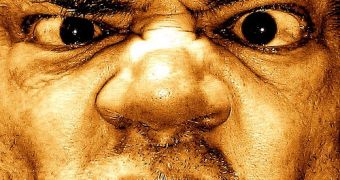A face like Steven Segal's may upset or raise concern, but there are some individuals with high levels of testosterone who actually enjoy angry looks and even seek methods to provoke them, as suggests a new research.
"It's kind of striking that an angry facial expression is consciously valued as a very negative signal by almost everyone, yet at a non-conscious level can be like a tasty morsel that some people will vigorously work for," said study co-author Oliver Schultheiss, an associate professor of psychology at the University of Michigan.
"The findings may help explain why some people are so fond of teasing. Perhaps teasers are reinforced by that fleeting 'annoyed look' on someone else's face and therefore will continue to heckle that person to get that look again and again. As long as it does not stay there for long, it's not perceived as a threat but as a reward," said Schultheiss.
He and lead author Michelle Wirth checked out testosterone levels in subjects and then made them do a computer operation in which some complex keyboard sequences provoked various images on the computer screen: an angry face, a neutral face, or no face.
Males and females that displayed larger testosterone amounts than other individuals of the same sex were more receptive to angry face sequence than to the other sequences, fact not found amongst subjects with lower testosterone levels.
The connection between larger testosterone amounts and better learning of the angry face keyboard sequence was more powerful when angry faces flashed on the computer screen subliminally, so fast that the subjects could not identify them consciously.
"Better learning of a task associated with anger faces indicates that the anger faces were rewarding, as in a rat that learns to press a lever in order to receive a tasty treat. In that sense, anger faces seemed to be rewarding for high-testosterone people but aversive for low-testosterone people," said Wirth.
"Testosterone levels are known to be higher in socially dominant individuals. Such people may find angry faces stimulating because they could signal a challenge to their dominance. Alternatively, they may indicate a foe who has already been defeated or otherwise upset, thus reinforcing the viewer's dominant status," said Schultheiss.

 14 DAY TRIAL //
14 DAY TRIAL //